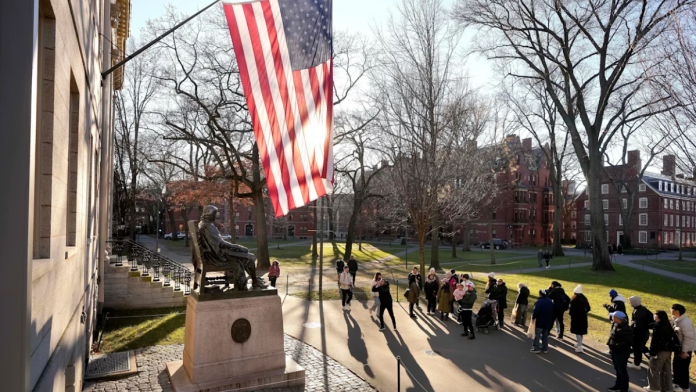The Trump administration has taken another sharp step against Harvard University, signaling a dramatic escalation in its ongoing dispute with the Ivy League school. Education Secretary Linda McMahon announced that Harvard will now be placed under “heightened cash monitoring.”
This move means the university must first use its own money to cover financial aid for students. Only after that will the school be allowed to apply for reimbursement from the federal government. McMahon also warned that additional enforcement action could soon follow if Harvard fails to provide requested records about its admissions system.
The Education Department is demanding proof that Harvard is no longer using race as a factor when evaluating applicants. Officials argue that the school has not supplied all the necessary documents about how it reviews both applicants and admitted students. The department said this information is essential to confirm compliance with federal law and the Supreme Court’s ruling.
A clash over admissions and funding
The growing fight is tied to long-running controversies around Harvard’s admissions practices. In 2014, a group of students sued the university, saying its policies unfairly hurt white and Asian applicants. That legal battle climbed through the courts until 2023, when the U.S. Supreme Court ruled that race could no longer be considered in college admissions. The Supreme Court is the highest court in the United States, and its rulings are final and binding for all schools.
Now, federal authorities are pressing Harvard to show that it has fully complied with that decision. The demand for records is part of a larger campaign led by the Trump administration that has spread across many universities, with the government requiring schools to prove they are not factoring race into admissions decisions.
The dispute is not only about admissions but also about money. The administration has already cut off billions of dollars in research funding for Harvard, accusing the school of failing to make major changes to its governance and disciplinary policies. According to university officials, the government withheld $2.6 billion in federal research support.
Harvard challenged that decision in court. Earlier this month, a federal judge sided with the university, ruling that the Trump administration had engaged in an unfair, targeted effort against major research institutions. Following that order, the Department of Health and Human Services released $46 million in frozen research funds for Harvard. University officials confirmed the release of the money but did not provide additional details on the wider funding situation.
Harvard’s endowment and federal scrutiny
While the legal and political fight continues, questions are also being raised about Harvard’s financial strength. Education Secretary McMahon said she was concerned about the university’s long-term stability, since federal support is now uncertain.
Harvard’s China Gambit Backfires—Treasury Considers Crushing Sanctions Case
Harvard, however, has an endowment of about $53 billion, the largest of any university in the United States. An endowment is like a massive savings and investment fund built from donations, and the returns are used to support scholarships, research, and day-to-day operations. This large financial base gives the university significant resources, though the federal restrictions may still affect how the school manages its budgets in the short term.
Despite its financial cushion, the new monitoring requirements mean Harvard will have to navigate more complicated procedures to access federal aid. The shift could slow down reimbursements for student support and research funding, adding to the strain created by the administration’s broader oversight campaign.
The situation highlights the widening rift between President Donald Trump’s administration and elite universities. Federal officials have accused top colleges of fostering bias and resisting oversight, while universities have defended their policies as necessary to maintain fairness and academic freedom.
For now, Harvard has not publicly commented on the most recent federal actions. The tension remains high, as the government continues its push for records and compliance, while the university’s access to billions in federal funding remains at stake.


